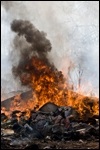Note: This article has been excerpted from the SmallGroups.com training tool called Answering Tough Questions.
Major natural disasters are often described as being "of biblical proportions." That description raises profound questions about the nature and power of God—questions you're likely to be asked as a small-group leader, particularly if the disaster occurs close to home.
Faith-Shaking Events
Many were troubled by the tragic tsunami that struck Southeast Asia in late 2004 and killed nearly 300,000 people. Theologian and bishop Tom Wright expressed the confusion and despair of many when he said: "What's the point in saying, 'The heavens declare the glory of God,' if tidal waves declare his incompetence?"
In the West, it is easy to think of nature as serene and safe—the way that many people who enjoy the comforts of the modern world experience it. We are used to nature when and how we like it. But natural disasters are faith-shakers. As one commentator wrote in 2004: "God, if there is a God, should be ashamed of himself. The sheer enormity of the Asian tsunami disaster—the death, destruction, and havoc it has wreaked, the scale of the misery it has caused—must surely test the faith of even the firmest believer."
Dealing With a Mystery
Edward Spence, an Australian philosopher, observes: "Ultimately, the problem of evil confronts us not as a puzzle to be solved but as a mystery to be experienced." Archbishop of Canterbury Rowan Williams notes this experience in the lives of those who serve the victims: "The odd thing is that those who are most deeply involved … are most aware of two things: a kind of strength and vision just to go on; and a sense of the imperative for practical service and love. Somehow in all of this, God simply emerges for them as a faithful presence."
In other words, armchair philosophers toil over God's will while those on the scene work with His strength.
A week after the tragedy in Southeast Asia, Barney Zwartz wrote, " … mystery remains. Why isn't Love-without-suffering the meaning of things. Why does God endure His suffering? Why does He not at once relieve His agony by relieving ours? All I can say is, God alone knows—and that's enough."
True to history, theologian Stanley Hauerwas shows, for the early Christians, suffering was not a metaphysical problem needing a solution but a practical challenge needing a response of faith. Apparently it never occurred to them to question their belief in God or his goodness because they were unjustly suffering. Rather, their faith gave them direction in the face of persecution and general misfortune.
Talking About God
Al Mohler, president of the Southern Baptist Theological Seminary, says Christians ought to respond as the Bible does. "A faithful Christian response will affirm the true character and power of God—his omnipotence and his benevolence. God is in control of the entire universe. And God's goodness and love are beyond question. The Bible leaves no room for equivocation on either truth. … We must speak where the Bible speaks, and be silent where the Scripture is silent. Christians must avoid offering explanations when God has not revealed an explanation."
—Rob Moll and Ted Olsen; copyright 2006 by the author and Christianity Today.
Discuss:
- Has our church (or its members) dealt with a natural disaster? What happened and what lessons can we learn?
- What are some natural disasters that occurred in the Bible? How does Scripture relate God to them?
- How should the church respond to crises of faith such as a natural disaster? How can we respond practically to such a disaster?









